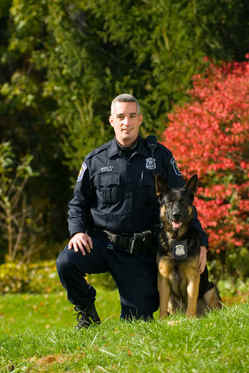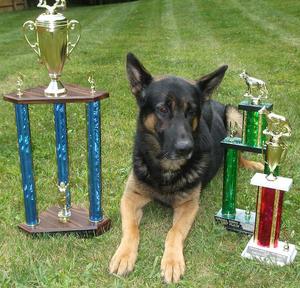A look inside the life of an Ann Arbor Police Department dog: Shepherds are a popular choice

Officer Maguire and Lenny
Photo courtesy of Ann Arbor Police Department
In mid-April we shared the story of Alpine, a therapy dog for a local hospice, and last year we wrote about the K9 unit at Detroit Metro Airport.
The Ann Arbor Animal Hospital does annual preventative health, emergency care, and other general health concerns for police dogs at the Ann Arbor Police Department. We recently reached out to Officer Patrick Maguire of the AAPD with our list of questions on working animals, and he gave us a lot of information in his answers.
It was too much for a single post, so we've decided to split it into two parts. So here is part one of "More than man's best friend: Meet Lenny of the AAPD."
What breeds of dog are used?
Lenny is a German Shepherd from Slovakia. While many types of dogs can be, and are, used for police work, the Shepherd is a popular choice for several reasons. They have been bred and used for this type of work for many generations. They have a great disposition and personality and tend to be very loyal to their human “partner.”
Lastly, the German Shepherd is a great choice for police work in that they are a great all-around fit for the job. Their size and athleticism means that they are excellent for tracking and chasing down bad guys. Their great nose makes them an excellent fit for “detection work” where they are asked to help find explosives, drugs or other contraband.
Is one sex preferred over the other?
Many people assume that police dogs need to be males in order to be aggressive enough for police work. However, I have seen many female dogs used in police work, and they have worked just as well as the males I have seen.
How do you find or recruit dogs for your program? Where do they come from?
Lenny was imported from Slovakia. He was purchased from an importer/breeder in Ohio who specializes in raising his own dogs as well as importing them from overseas specifically for police and work.
Are the dogs' temperaments tested before allowing them to proceed to the training phase?
Yes. When we picked out Lenny, we spent a day looking at lots of different dogs that were available. I was assisted by several highly experienced dog handlers who put the dogs through various tests and games to check things like their drive for a ball, their ability to sniff out a toy, their reactions to different surroundings and their interaction with people. Once we picked Lenny, he was sent to MSU’s school of veterinary medicine for a day to be checked over from snout to tail to make sure he was physically fit for duty.
Do you buy trained adult dogs or young dogs that you train? Please describe any training that you do.
The AAPD has bought adult dogs and has also trained dogs from the puppy stage. The route we chose depended on the resources available at the time as well as how soon the dog needed to be ready for patrol.
Lenny was about 18 months old when I was partnered with him. While he had some very basic training from his breeders in Slovakia, he was considered a “green” or untrained dog.
Lenny and I went to Ft. Wayne, Ind. for three and a half months of training. This training consisted of everything Lenny needed to know to be a police dog. We started with basic obedience (sit/stand/stay/heeling, etc) and worked our way up to teaching Lenny how to track people outdoors, sniff out people hiding in buildings and sniff for drugs.
The school also focused on teaching me how work with Lenny and read his behavior so I could tell what he was doing when he was working. By the time we graduated, Lenny and I were certified to track, apprehend bad guys, and sniff out drugs.

Lenny showing off his trophies
Photo courtesy of Patrick Maguire
Lenny and I are certified by the United States Police Canine Association. Twice each year, Lenny and I travel to certifications where we train with other K9 teams from all over Michigan and Ontario. Aside from using these events as a recertification process to show proficiency in our abilities, we also get to compete against other K9 teams. Over the years Lenny has landed quite a few trophies, especially in the areas of obedience and agility (running and jumping and climbing obstacles).
How do you stay abreast of new threats or changes in their environment and how does that translate to new and different training?
Aside from constantly networking with other K9 handlers and experts, I keep up with changing trends by reading K9 publications and subscribing to online services. The things I learn about, whether through networking or research, we try to put into practice by training with other K9 teams weekly. We also vary our training by seeking out different and new training locations and scenarios on a constant basis.
Are dogs trained for one mission or focus, or are they trained for multiple missions, e.g., drugs + explosives + agriculture products, or search and rescue + tracking, etc.?
In police work, dogs are often trained in several fields. They are generally used to track people, protect their handlers (apprehend a suspect with their teeth), and detect odors such as drugs, bombs, or other contraband. While the dogs can be trained in many different jobs, they are generally trained in just ONE type of odor detection. For example, a dog COULD be trained in detecting drugs and explosives; however this is not desirable, because if the dog gives an alert on a search, you would not know whether to look for drugs or evacuate the area due to a possible bomb.
What medical conditions, injuries, or on-the-job hazards do these dogs develop or encounter?
Police work is pretty grueling for dogs. They can get banged around and beat up from the years of riding around in the back of a car and the jumping and climbing involved in the work. Lenny has sustained a couple of cuts from getting caught on sharp objects or falling. He has also had some ‘sprains and strains’ from the running and jumping.
Other hazards to police dogs are the threat of ingesting things. They are using their nose to get up close and personal to search for contraband. However, almost all of the things they are looking for can be harmful or fatal if ingested. A handler has to keep a watchful eye on his K9 partner to be sure that the dog doesn’t accidentally ingest dangerous chemicals.
Speaking of eating, what do you feed your dogs? Do they get any special treats?
Lenny eats Solid Gold brand dog food. He used to eat a blend made from ground salmon and now eats a blend made mostly from buffalo. Lenny can sometimes be a picky eater, and these foods have satisfied his distinctive palate while keeping his coat looking handsome.
That's the end of part one. Many thanks to Officer Maguire and the Ann Arbor Police Department, and we'll be posting the second half soon.
David Caddell is the hospital director of the Ann Arbor Animal Hospital, a locally owned and operated Companion Animal Hospital. David can be reached at 734-662-4474 or dcaddell@AnnArborAnimalHospital.com.


Comments
janejane
Mon, Apr 30, 2012 : 5:22 p.m.
Thanks for the great article. Lenny is a very handsome shepherd! (Officer Maguire is good looking, too.)